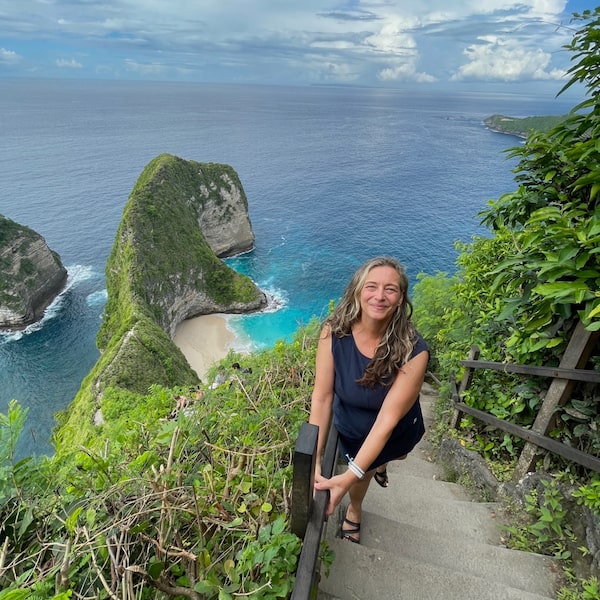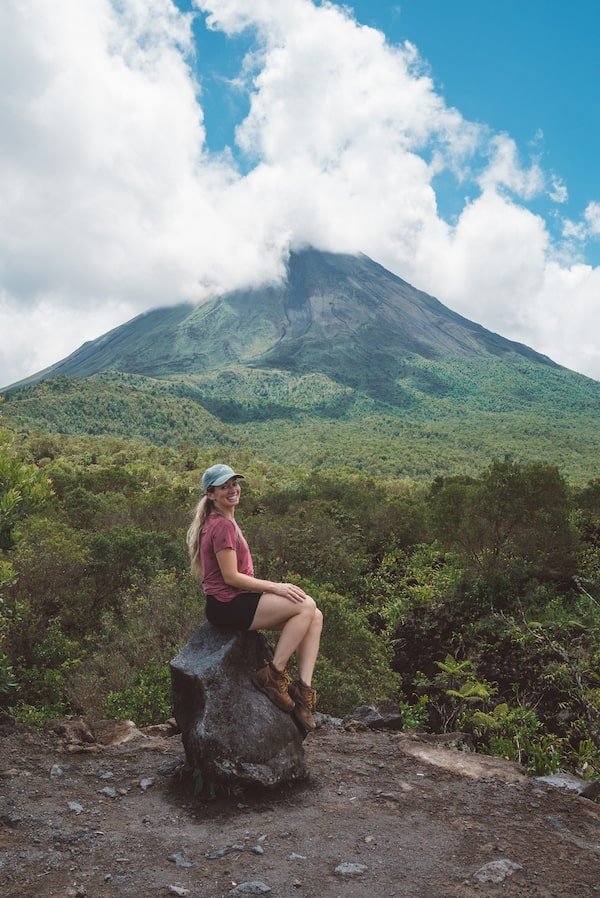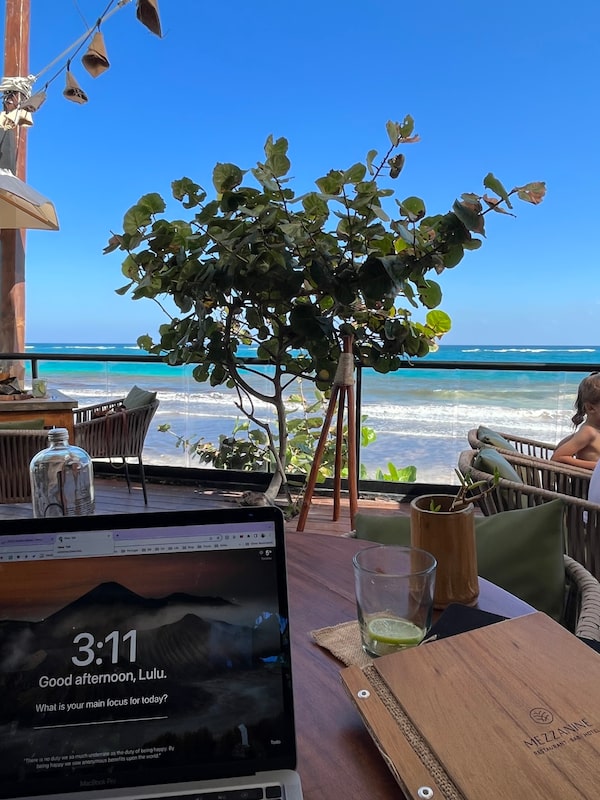Picture this: You open your laptop and look up. And the view isn’t your apartment wall, but a sandy beach or a lush rainforest. This is the reality for many digital nomads. And there’s more of them, too: The number of people who travel freely while working remotely has grown significantly since COVID-19 forced many to work from home.
According to Think Remote, a media company focused on remote work, in 2020, 10.9 million people worldwide described themselves as digital nomads; by the end of 2022, this number more than tripled. Some of these folks are self-employed entrepreneurs or freelancers and some work for companies that are either fully remote or have policies that allow for short stints abroad.
We talked to several Canadian remote workers on the best destinations they’ve set up shop in over the past year; plus, two experts weigh in on the pros and cons to consider when working from these locales.
Bali, Indonesia

Nadene Rehnby.Supplied
Who: Nadene Rehnby, 57
What they do: Graphic designer
Home base: Vancouver
Rehnby has been working remotely for more than a decade. “I sort of stumbled into it,” she says. She had an offer to rent her house during the 2010 Olympics and hasn’t looked back since. She’s at home half of the year – she shares the space with roommates who help cover the cost of her mortgage – and the rest of the time she’s on the road. In the past year she’s been to Mexico, Indonesia, the U.S. and across B.C. While she loves being a digital nomad, she acknowledges its challenges, such as the social isolation, carbon footprint and how an influx of foreigners to certain areas can drive up costs for locals.
In Bali, she spent time in Ubud (including a stay at a digital nomad co-living centre), Gili Trawangan, Nusa Lembongan, Nusa Penida and Canggu. “I love everything about Bali,” she says. “The kindness of the people, the daily ritual of practising gratitude, the lush nature, the affordable cost of living – I could go on.” She notes that Canggu attracts many digital nomads, but is loud and crowded. However, islands like Gili Trawangan have a more laid-back lifestyle, which includes biking, scuba lessons, watching outdoor movies and listening to live music.

'I love everything about Bali,' Rehnby says.Supplied
What the experts say: “There are generally two major areas in Bali that are frequented by digital nomads,” says Liam Martin, who is from Ottawa and is one of the organizers of Running Remote, the world’s largest conference on building and scaling remote teams.
Rehnby was right: “Canggu is great if you love to beach and party,” says Martin. However, it also has dozens of co-working spaces, co-living communities, as well as cafés to work from. (He recommends Livit for co-working and Outpost for co-living.) “It’s seen massive growth and investment post-COVID with real estate prices increasing by a whopping 50 per cent plus in the last few years.” He says that Ubud has a very different feel. “Lots of yoga studios, lush jungles, relaxed lifestyle and longer-term ‘slowmads’ usually live here,” Martin notes. He adds that Outpost has another co-living space in Ubud (this is the one Rehnby stayed at). “If you’re looking for a multiple month stay, I’d choose Ubud versus Canggu.”
Syros, Greece

Rekha Magon, Rik Magon and their two children.Supplied
Who: Rekha Magon, 39, Rik Magon, 47, and their 11- and nine-year-old kids
What they do: Entrepreneurs
Home base: Montreal
Rekha has been a self-employed entrepreneur for many years, which has always given her the freedom to work remotely. In 2021, she co-founded Boundless Life, a company that offers living abroad experiences for families – complete with housing, education for kids and more. Over the past 18 months, Rekha and her family have spent time in Portugal, Greece and Italy. Rekha and her husband, a real estate developer, worked remotely and their son and daughter attended Boundless Life education centres. When she reflects on her family’s time in Syros, Rekha points to its affordable cost of living, proximity to other Greek islands – such as Mykonos, Tinos and Ikaria – and culture of work-life balance. “Our children had an unforgettable experience,” she says. “From sailing lessons in the Aegean Sea to mastering the art of crafting fresh Greek cheese. … In fact, my son was so inspired by the food that he decided to dress up as a souvlaki for Halloween.”

'Our children had an unforgettable experience,' Rekha Magon says.Supplied
What the experts say: “Generally, as a Canadian, you don’t need a visa to go for a short-term visit to Greece,” says Evelyn Ackah, the founder and managing lawyer of Calgary-based Ackah Business Immigration Law. “But if it’s going to be longer than a few months, you may need to leave and come back in.” If you do plan on staying in any country for a longer period of time, Ackah says that remote workers should prepare to be adaptable. “If you’re moving around a lot, that’s fine. I think it’s easier if you’re a month here and a month there. … It’s harder when you’re spending a long block of time somewhere,” she says. “If there’s uncertainty of what’s going to happen at the airport or the consulate, you’ve got to be flexible. So, if you can’t get to Greece, for example, you go to Istanbul instead.” Also, because Europe is known for its road trips, Ackah says to make sure you have an international driver’s licence. “If you’re driving as opposed to Ubering everywhere … you can’t be sure, necessarily, if your licence will be valid or how long it will be.”
Turrubares, Costa Rica

Siya Zarrabi and Kristen Sarah.Supplied
Who: Siya Zarrabi and Kristen Sarah, both 37, and their five-year-old daughter
What they do: Content creators
Home base: Brampton, Ont.
These high-school sweethearts have worked remotely full-time for almost a decade on the travel blog Hopscotch the Globe. They usually spend about three to four months a year travelling – in 2023, they were in Costa Rica, the U.S., Croatia and other parts of Canada. “Working from Costa Rica is pretty great,” says Sarah. “You can spend a few hours working, take a break and go for a short drive to a waterfall, jump in, have a picnic … and then head back to wherever there’s a Wi-Fi signal and work a little longer.”

'Working from Costa Rica is pretty great,' says Sarah.Supplied
Sarah says rent in Costa Rica – ranging from $300 to $2,000 a month, or more – depends on location. In Turrubares, 95 kilometres southwest of San José, they spent $1,000 to rent a three-bedroom, two-storey house for a month. “It had the most incredible jungle views on one side and a volcano on the other.” She adds that renting a car isn’t cheap (around $350 a week) – “but if you’re somewhere where you can walk everywhere, like a beach town, a car isn’t necessary.”
What the experts say: “You don’t need a visa to go to Costa Rica as a Canadian citizen. But if you’re a citizen of another country, you might,” says Ackah. “I’ve been there too several times … and the culture is so laid back.” However, she says that knowing the laws is important. “Sometimes people think: ‘Well it’s the same as Canada or the U.S.,’ but every country is different.” (For example: driving over 150 kilometres an hour in Costa Rica can land you in jail.) “Know the laws to keep you safe and also to keep you in good standing so they’ll let you come back.”
Ackah says that travel insurance is of course important – no matter where you choose to work remotely – but you also need to consider how long you’re away from home. “You run the risk of losing your Canadian provincial coverage if you’re gone for six months or more,” she says. “The snow birds all come back in just under six months for that exact reason.”
Portland, Ore.

Sierra Riley.Supplied
Who: Sierra Riley, 27
What they do: Journalist and former Narcity editor
Home base: Vancouver
Riley has been working remotely since 2021. With loved ones living across Canada and the globe – from Ontario to Dubai – she often combines visiting family with working from wherever she happens to be. Over the past year, she’s worked from Calgary, Toronto and Portland, proving that the digital nomad life doesn’t need to be in some far-flung destination.

'Getting health care was a bit of a worry,' Riley says.Supplied
She didn’t expect to love Portland as much as she did. “I mostly chose the city because it was a short, cheap and scenic train ride away,” she says. “Plus, Oregon doesn’t have a state sales tax, so that helped keep travel costs low.” Also, via her subscription to Trusted House Sitters ($169 a year), a worldwide pet- and house-sitting website, she scored free accommodations – and a furry friend – during her stay.
Portland’s pros? Riley says the food truck scene, parks, thrift stores and indie movie theatres. The cons? Although she has travel insurance through her credit card, she says “getting health care was a bit of a worry, but thankfully no need for a doctor’s visit arose.”
What the experts say: Ahead of an extended U.S. stay, Ackah suggests talking to a legal advisor so you know what to say to an agent at the border. “I’ve had clients where maybe their spouse got a U.S. work permit and they’re coming along and going to continue working remotely within Canada. And they say, ‘You can’t do that without a work permit,’ and it becomes a big to-do.”
Ackah adds that health benefits and taxes are important to keep in mind. “Make sure you have travel insurance because, as we know, the U.S. is so expensive with health coverage,” she says. “It’s also important to talk to a cross-border tax specialist. It might just require a filing even if there’s no income from the States.”
Tulum, Mexico
Lulu Liang.Supplied
Who: Lulu Liang, 30
What they do: Entrepreneur and former media executive
Home base: Was Toronto and is now Lisbon
Liang and her husband were living downtown, working from home in Toronto when COVID-19 hit. When the time came to renew their lease in June, 2020, they decided to move out and start their digital nomad journey.
At first, they tested the waters in Canada – North Bay, Calgary, Vancouver – and in November, 2020, they left the country. This year, they’ve spent time in Tulum and Madrid, as well as in their new home base in Lisbon (Portugal is another hot spot for digital nomads, according to Martin). The couple bought a place in Tulum in 2021 for US$100,000 and spend a big part of each year there. “We get around on a scooter when we want to go into town or the beach,” says Liang. “Otherwise, I walk around our area, which has a great expat community.” Liang loves Tulum’s accessibility to Toronto (a direct four-hour flight from nearby Cancun), great weather, fast internet, low cost of living and “five-star vacation-like weekends.”

Liang loves Tulum’s 'five-star vacation-like weekends.'Supplied
What the experts say: “Tulum has recently had significant investments in internet connectivity, which allows for great connection to work remotely,” says Martin. “It’s also a short drive to Playa del Carmen – which is another digital nomad hot spot – and Cancun, which is one of the most popular airports in the world and has direct flights to 29 different countries.” Martin says that staying in the city is significantly cheaper than renting oceanside and that it’s just a short car or bike ride to the beach. “My general suggestion is to set yourself up at a hotel co-working space like Selina Tulum and spend a week getting your bearings and figuring out which location you’d like to set up in.” However, if you are looking to save money, he adds that travelling in the off season will get you a good deal. “If you can deal with the heat, it’s very cheap in the summer months,” he says. “And keep in mind that the sargassum season can come and go; so, if you want a seaweed-free beach, I would check ahead for conditions.”